15 Ways Technology Can Make You Sick ( courtecy;-reader's digest )BY DAMON BERES AND CLAIRE NOWAK Modern gadgets make anyone's life a breeze—until they don't.
- লিঙ্ক পান
- X
- ইমেল
- অন্যান্য অ্যাপ
15 Ways Technology Can Make You Sick
BY DAMON BERES AND CLAIRE NOWAK
Modern gadgets make life a breeze—until they don't.
Panic attacks
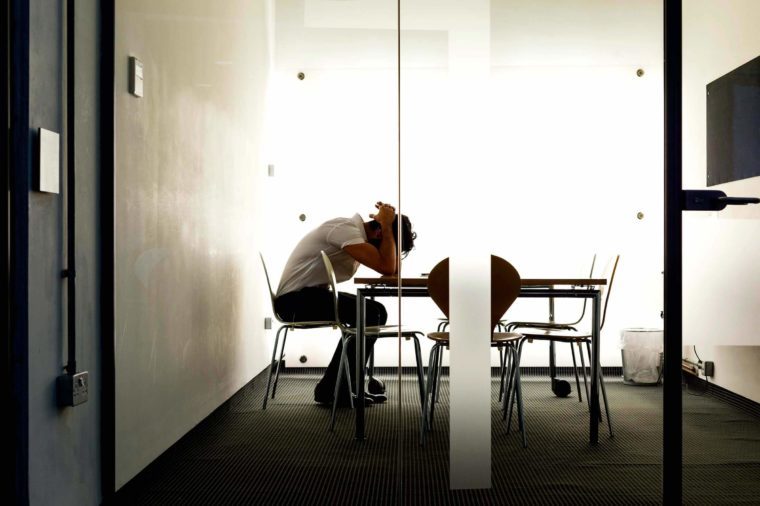 ISTOCK/SOLSTOCKPsychologists say they've noticed that a new condition called "nomophobia"—short for "no-mobile-phone phobia"—is affecting more and more young people. Symptoms like anxiety and distraction occur when sufferers are separated from their phones and unable to check for updates. Researchers liken this condition to addictions such as gambling. Here's how to know if you have nomophobia without even knowing it.
ISTOCK/SOLSTOCKPsychologists say they've noticed that a new condition called "nomophobia"—short for "no-mobile-phone phobia"—is affecting more and more young people. Symptoms like anxiety and distraction occur when sufferers are separated from their phones and unable to check for updates. Researchers liken this condition to addictions such as gambling. Here's how to know if you have nomophobia without even knowing it.Weak sperm
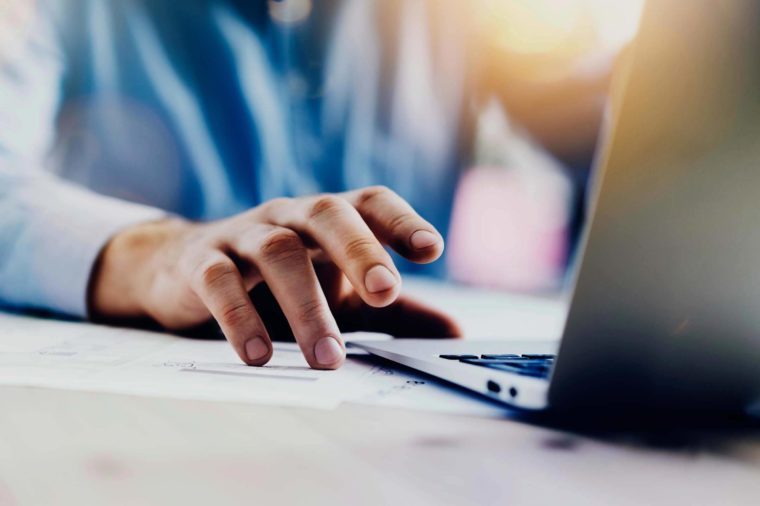 ISTOCK/PINKYPILLSA study shows that Wi-Fi signals could potentially damage sperm and stop them from moving, leading to fertility issues in men. Scientists note that more research is needed before any conclusions can be drawn, but in the meantime, it couldn't hurt for guys to keep devices off their laps. Here are more surprising health risks men need to watch out for.
ISTOCK/PINKYPILLSA study shows that Wi-Fi signals could potentially damage sperm and stop them from moving, leading to fertility issues in men. Scientists note that more research is needed before any conclusions can be drawn, but in the meantime, it couldn't hurt for guys to keep devices off their laps. Here are more surprising health risks men need to watch out for.Computer vision syndrome
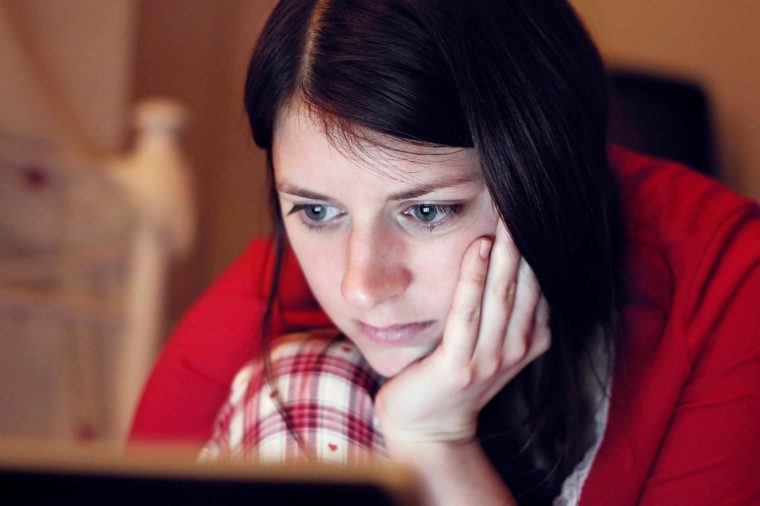 ISTOCK/JOEGOLBYStaring at a computer screen for hours at a time isn't doing your eyes any favors: doing so can lead to computer vision syndrome, with symptoms including eyestrain, headaches, and blurred vision. To alleviate problems, try to reduce glare on your monitor, blink often, and take frequent breaks. Don't miss these ways your screen time is affecting your productivity.
ISTOCK/JOEGOLBYStaring at a computer screen for hours at a time isn't doing your eyes any favors: doing so can lead to computer vision syndrome, with symptoms including eyestrain, headaches, and blurred vision. To alleviate problems, try to reduce glare on your monitor, blink often, and take frequent breaks. Don't miss these ways your screen time is affecting your productivity.Texting thumb
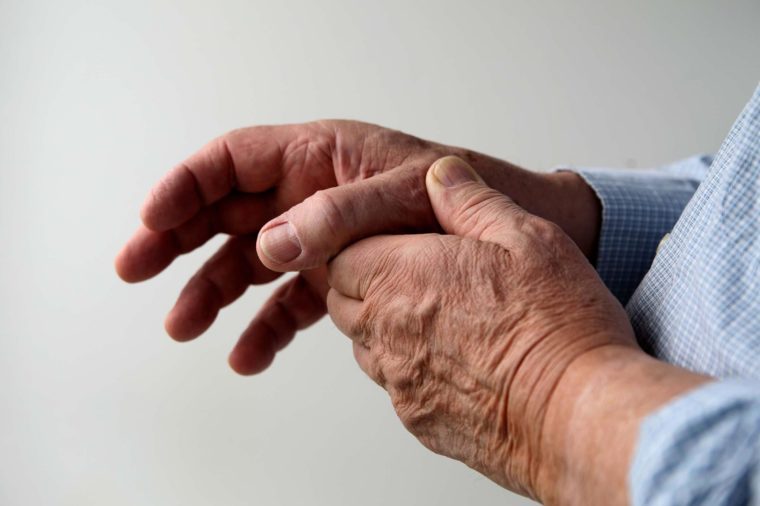 ISTOCK/NEBARIHand specialists have reported a rise in tendinitis of the thumbs due, they say, to an increase in cell phone and computer use. Warning signs of the condition include tingling or numbness. If you have an afflicted finger, help it heal by resting it or with physical therapy.
ISTOCK/NEBARIHand specialists have reported a rise in tendinitis of the thumbs due, they say, to an increase in cell phone and computer use. Warning signs of the condition include tingling or numbness. If you have an afflicted finger, help it heal by resting it or with physical therapy.Bad posture
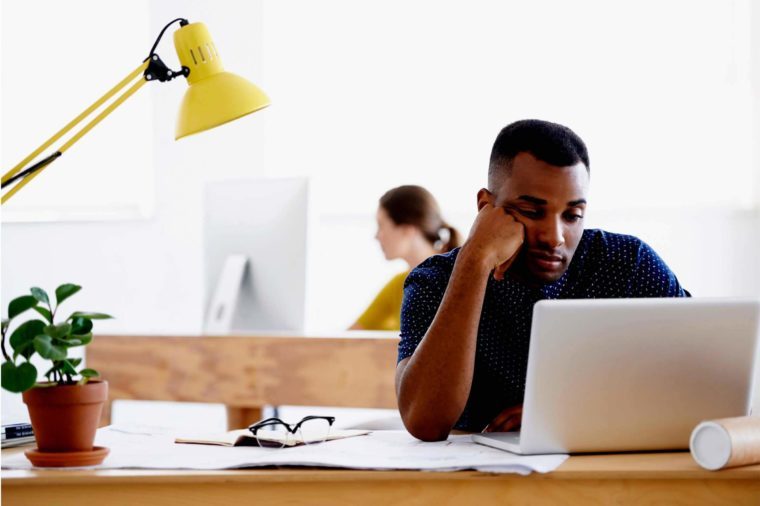 ISTOCK/YURI_ARCURSSitting in a hunched position at your desk all day can lead to back pain down the line—not good. To alleviate discomfort, try a Thoracic Bridge stretch.
ISTOCK/YURI_ARCURSSitting in a hunched position at your desk all day can lead to back pain down the line—not good. To alleviate discomfort, try a Thoracic Bridge stretch.Cell phone elbow
 ISTOCK/NEIL SPEERSOne might fall victim to this ailment no matter how smart their phone is, but "cell phone elbow" refers to a condition where people hurt an "essential nerve in their arm by bending their elbows too tightly for too long," according to CNN. You might notice discomfort if you hold your phone next to your ear for a long conversation. Possible solutions? Switch hands, or use headphones with built-in mics or Bluetooth headsets.
ISTOCK/NEIL SPEERSOne might fall victim to this ailment no matter how smart their phone is, but "cell phone elbow" refers to a condition where people hurt an "essential nerve in their arm by bending their elbows too tightly for too long," according to CNN. You might notice discomfort if you hold your phone next to your ear for a long conversation. Possible solutions? Switch hands, or use headphones with built-in mics or Bluetooth headsets.Cybersickness
 ISTOCK/SQUAREDPIXELSResearchers have puzzled over this condition for years, and found that it affected people who spent time in virtual reality (VR). Unfortunately, VR today includes more common experiences, like 3D movies or even HD displays on your phone or tablet. (Apple moved to update its operating system on iPhones and iPads following reports that iOS7 made some users queasy.) Symptoms include nausea and headaches. Look out for these subtle signs that you're getting sick.
ISTOCK/SQUAREDPIXELSResearchers have puzzled over this condition for years, and found that it affected people who spent time in virtual reality (VR). Unfortunately, VR today includes more common experiences, like 3D movies or even HD displays on your phone or tablet. (Apple moved to update its operating system on iPhones and iPads following reports that iOS7 made some users queasy.) Symptoms include nausea and headaches. Look out for these subtle signs that you're getting sick.Thigh burn
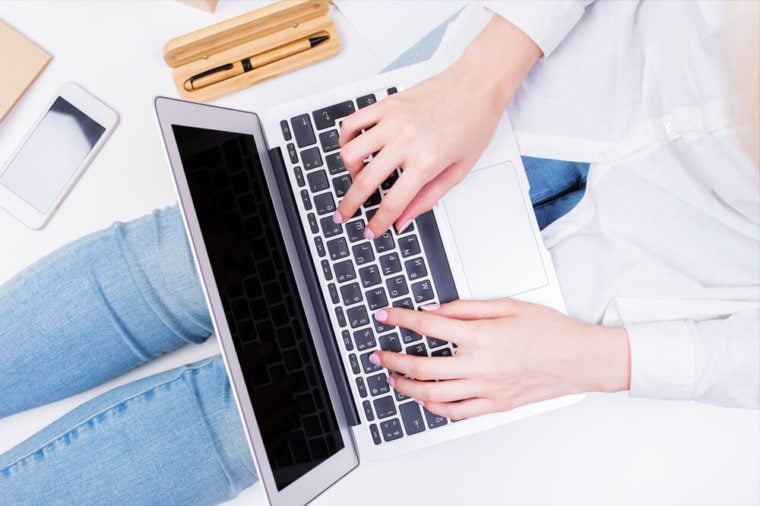 PESHKOVA/SHUTTERSTOCKDon't be fooled by its name: your laptop isn't really all that friendly to your lap. In fact, leaving it on your lap for too long can lead to erythema ab igne, a skin condition caused by overexposure to heat. Symptoms can range from a rash that goes away after a few days to severe discoloration that may be permanent.
PESHKOVA/SHUTTERSTOCKDon't be fooled by its name: your laptop isn't really all that friendly to your lap. In fact, leaving it on your lap for too long can lead to erythema ab igne, a skin condition caused by overexposure to heat. Symptoms can range from a rash that goes away after a few days to severe discoloration that may be permanent.Carpal tunnel syndrome
 PEDALIST/SHUTTERSTOCKA small study published in the journal Muscle & Nerve suggested that people who spend extended amounts of time on their smartphones, tablets, or game consoles (nine or more hours a day) had significantly more wrist and hand pain. This study followed up a previous, larger study in which intensive device use was categorized as five or more hours a day. More than half of the participants who used their phones or devices intensively musculoskeletal pain or discomfort. Only 12 percent of the other group (on their devices five or less hours a day) had these symptoms. These numbers may exaggerate how long people actually spend on their phones, but study author Pete White says "caution may be warranted when using hand-held electronic devices, in order to minimize the chance of developing carpal tunnel syndrome."
PEDALIST/SHUTTERSTOCKA small study published in the journal Muscle & Nerve suggested that people who spend extended amounts of time on their smartphones, tablets, or game consoles (nine or more hours a day) had significantly more wrist and hand pain. This study followed up a previous, larger study in which intensive device use was categorized as five or more hours a day. More than half of the participants who used their phones or devices intensively musculoskeletal pain or discomfort. Only 12 percent of the other group (on their devices five or less hours a day) had these symptoms. These numbers may exaggerate how long people actually spend on their phones, but study author Pete White says "caution may be warranted when using hand-held electronic devices, in order to minimize the chance of developing carpal tunnel syndrome."Overeating
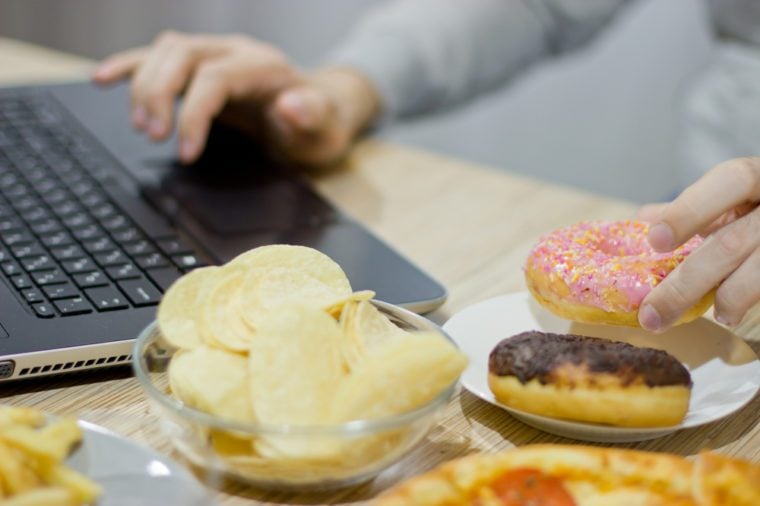 OKSANA FERKHOVA/SHUTTERSTOCKSocial media is flooded with pictures of perfectly styled, drool-worthy food. They're fun to look at, but they could also be altering your appetite. One study showed that people are more drawn to photos of foods with a high-fat content than low-fat food, and they are more likely to find similar foods near them after seeing those pictures. Not only is so-called "food porn" inadvertently encouraging people to eat unhealthy foods, but it's also making it harder for people to break that habit. Another study found that obese people have higher brain activity when they see photos of food than those of a healthy weight, especially when the foods were high in fat. The pictures even triggered a food-related brain response in obese participants when they weren't hungry.
OKSANA FERKHOVA/SHUTTERSTOCKSocial media is flooded with pictures of perfectly styled, drool-worthy food. They're fun to look at, but they could also be altering your appetite. One study showed that people are more drawn to photos of foods with a high-fat content than low-fat food, and they are more likely to find similar foods near them after seeing those pictures. Not only is so-called "food porn" inadvertently encouraging people to eat unhealthy foods, but it's also making it harder for people to break that habit. Another study found that obese people have higher brain activity when they see photos of food than those of a healthy weight, especially when the foods were high in fat. The pictures even triggered a food-related brain response in obese participants when they weren't hungry.Sedentary lifestyle
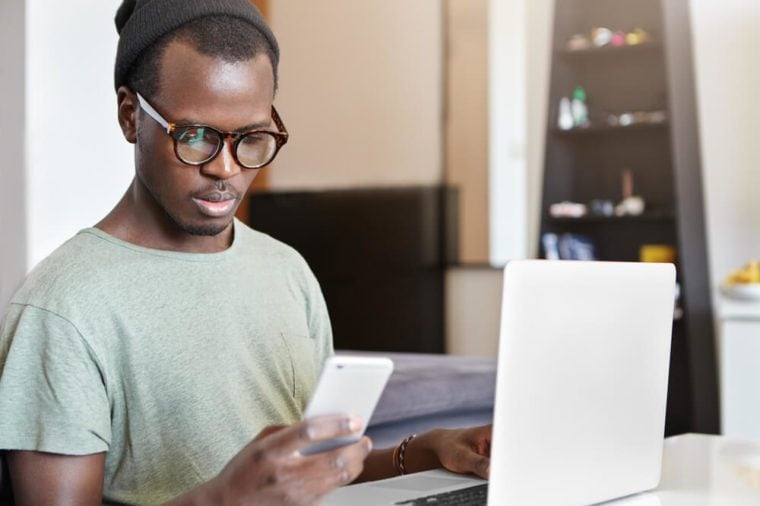 WAYHOME STUDIO/SHUTTERSTOCKFrom answering emails on a computer at work or watching TV at home, people spend most of their time using technology in a seated position. And the more prominent technology becomes in our lives, the more time we spend sitting and not being active. According to MedlinePlus, sedentary lifestyles come with serious health risks, including a higher risk of heart disease, high cholesterol, stroke, type 2 diabetes, and certain cancers. Look out for these scary health risks of binge-watching.
WAYHOME STUDIO/SHUTTERSTOCKFrom answering emails on a computer at work or watching TV at home, people spend most of their time using technology in a seated position. And the more prominent technology becomes in our lives, the more time we spend sitting and not being active. According to MedlinePlus, sedentary lifestyles come with serious health risks, including a higher risk of heart disease, high cholesterol, stroke, type 2 diabetes, and certain cancers. Look out for these scary health risks of binge-watching.Insomnia
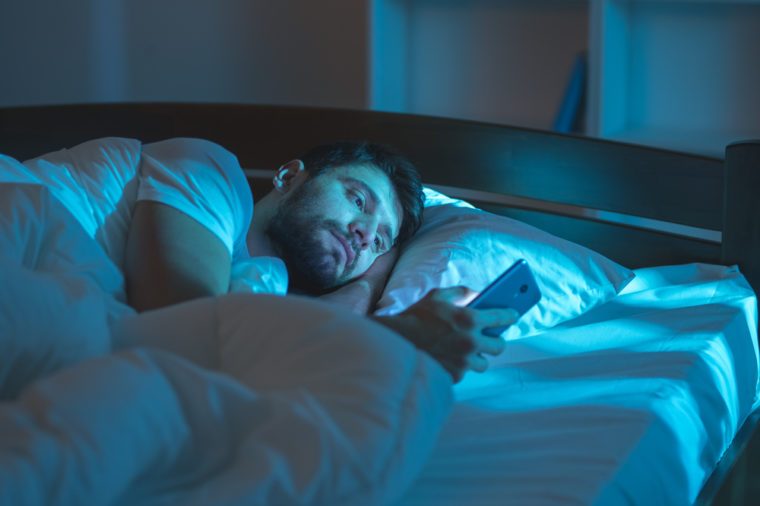 WEARE/SHUTTERSTOCKThe time you spend on your phone can impact how long it takes you to fall asleep and the quality of your sleep. In a 2016 study, researchers tracked 653 participants and determined the median time spent looking at their screens was 38.4 hours over 30 days. Forty-two percent of participants who spent that much or more time on their phones had difficulty sleeping, and around 35 percent of participants who used their phones for less than that also had sleep troubles. The results also showed people who used their phones right before bed were more likely to have poor sleep quality.
WEARE/SHUTTERSTOCKThe time you spend on your phone can impact how long it takes you to fall asleep and the quality of your sleep. In a 2016 study, researchers tracked 653 participants and determined the median time spent looking at their screens was 38.4 hours over 30 days. Forty-two percent of participants who spent that much or more time on their phones had difficulty sleeping, and around 35 percent of participants who used their phones for less than that also had sleep troubles. The results also showed people who used their phones right before bed were more likely to have poor sleep quality.Text neck
 STOCKFOUR/SHUTTERSTOCKLooking down at your phone all day puts strain on your neck, which holds up your 10-15 pound head. The longer you stay in that position, the more work your muscles have to do, and that can result in neck pain or potentially pulled muscles. Check out more common habits that are making you sick.
STOCKFOUR/SHUTTERSTOCKLooking down at your phone all day puts strain on your neck, which holds up your 10-15 pound head. The longer you stay in that position, the more work your muscles have to do, and that can result in neck pain or potentially pulled muscles. Check out more common habits that are making you sick.Hearing loss
 OLENA HROMOVA/SHUTTERSTOCKYou may like to turn up the volume on your headphones so that you can only hear your music, but that's actually a dangerous habit. Aaron Moberly, MD, assistant professor in the department of otolaryngology at The Ohio State Wexner Medical Center in Columbus, told Everyday Health that headphones deliver sound very close to your eardrums. Prolonged exposure could damage your ears and even cause hearing loss. He recommends keeping the volume at or below the halfway point.
OLENA HROMOVA/SHUTTERSTOCKYou may like to turn up the volume on your headphones so that you can only hear your music, but that's actually a dangerous habit. Aaron Moberly, MD, assistant professor in the department of otolaryngology at The Ohio State Wexner Medical Center in Columbus, told Everyday Health that headphones deliver sound very close to your eardrums. Prolonged exposure could damage your ears and even cause hearing loss. He recommends keeping the volume at or below the halfway point.Cancer
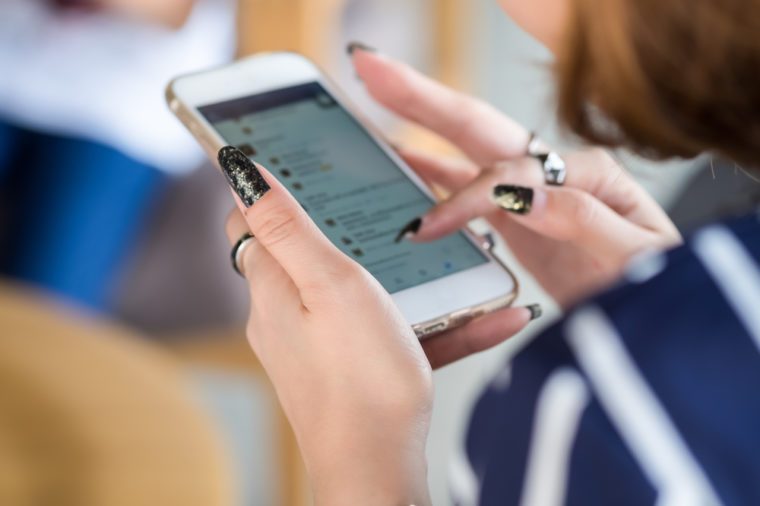 NOPPAWAN09/SHUTTERSTOCKIn studies by the National Toxicology Program, researchers exposed rats and other mice to radiofrequency radiation (RFR), which is emitted by cell phones, over the course of nine hours every day for two years (about 70 years for a human). The resulting exposure levels ranged from the maximum exposure that is legally allowed for cell phones to four times that amount. Researchers also found heart tumors called schwannoma in male rats exposed to "beyond the allowable cell phone emissions." While those specific tumors rarely turn cancerous and RFR can't cause cancer by damaging DNA, there are still concerns that this radiation could alter human tissue in ways that could cause cancer. But technology isn't the only surprising health hazard in your life. Here are more everyday things that pose huge health risks.
NOPPAWAN09/SHUTTERSTOCKIn studies by the National Toxicology Program, researchers exposed rats and other mice to radiofrequency radiation (RFR), which is emitted by cell phones, over the course of nine hours every day for two years (about 70 years for a human). The resulting exposure levels ranged from the maximum exposure that is legally allowed for cell phones to four times that amount. Researchers also found heart tumors called schwannoma in male rats exposed to "beyond the allowable cell phone emissions." While those specific tumors rarely turn cancerous and RFR can't cause cancer by damaging DNA, there are still concerns that this radiation could alter human tissue in ways that could cause cancer. But technology isn't the only surprising health hazard in your life. Here are more everyday things that pose huge health risks.- লিঙ্ক পান
- X
- ইমেল
- অন্যান্য অ্যাপ
মন্তব্যসমূহ
একটি মন্তব্য পোস্ট করুন